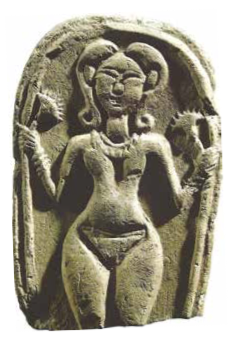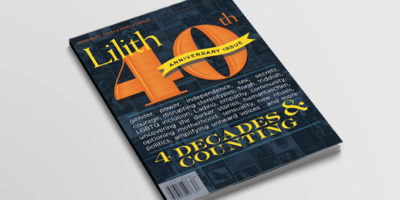
from “The Once and Future Womantasch”
Celebrating Purim’s full moon as “holy body day.” [Spring 1998]
 What is a hamantasch? A sacred vulva filled with black seeds. A food, source of nourishment, which we make with our hands reflecting our (women’s) felt sense of self-containment, of creativity and generativity. Ancient images of goddesses reveal that certain parts of the body—breasts, vulva, belly, buttocks—were believed to be holy, combining biological functions with processes of spiritual transformation. Hamantaschen remind us that the image of the female body was humanity’s first conceptualization of the workings of the cosmos. The Earth was a mother, fecund like us.
What is a hamantasch? A sacred vulva filled with black seeds. A food, source of nourishment, which we make with our hands reflecting our (women’s) felt sense of self-containment, of creativity and generativity. Ancient images of goddesses reveal that certain parts of the body—breasts, vulva, belly, buttocks—were believed to be holy, combining biological functions with processes of spiritual transformation. Hamantaschen remind us that the image of the female body was humanity’s first conceptualization of the workings of the cosmos. The Earth was a mother, fecund like us.
What is a womantasch? The same as a hamantasch.
And the black seeds in the womantasch? As the seed has within it the inher- ent power to root, grow, flower and fruit, so we have “power from within.” We reject the notion of “power over”; and we recognize instead that each of us is part of the creative being who is the universe herself.
When do we eat hamantaschen? At Purim, as Earth herself awakens from dormancy and begins again her sacred spring cycle of life. We honor the Earth’s body for it is our own. The sacred is not to be found on a pilgrimage. It is within us. If we treat our bodies as enemies, we doom ourselves to experiences of an amputated God. Let Purim be a celebration of body positive spirituality, of praising the Earth’s sacred vulva, and our own. It is not just the female body that demands respect and affirmation, but, by extension, it is all living things.
What is Holy Body Day? Esther Broner, in her novel A Weave of Women, creates a counter-holiday (which Purim implicitly is) in which we “women pray that we be restored to our own Temple.” Broner proclaims our thighs as the pillars of the Temple. We conclude Holy Body Day with food [a sacred vulva cookie would be appropriate] and Broner’s prayer: “Blessed art thou, O Mother of the Universe, from whose body we descend, who has kept us alive, nourished us and brought us to this season.”
Purim is called the ‘upside down’ holiday. For example, Haman gets hung instead of Mordechai; we get drunk instead of staying sober.
In the ‘upside down’ vein, let’s reclaim the full moon which has not really been reclaimed by Jewish women—though it’s opposite, the new or absent moon, Rosh Chodesh, has been. In all probability, the implications of the full moon frighten men. The full moon, upon which many Jewish holidays fall (not incidentally), represents women’s power—the mother at the height of strength—capable maturity personified.
It sounds like it makes sense to redeem Purim —the pre-spring, full moon time of split, denigrated womanhood (that reflects that deeply rooted biblical conviction that women are Other, are inferior)—into a time of re-sanctifying our bodies. Yes, this holiday has been waiting for us, like a seed hiding in a hamantasch, waiting to re-emerge.
…So the hamantasch is a trace-memory. Yes, an affirmation of the female body and the life cycle expressed with- in it. Spirituality is about embodiment and grounding, not about altered states of consciousness.
… I’ve always been piqued by the word “hamantasch”—on account of its etiology being so patently phony. A hamantasch is not a “Haman’s pocket” (or “Haman’s ear”) as most of us were once taught in Hebrew School, but a German-derived “mohn” (poppyseed) “tasch” (pocket). Okay, that’s straightforward—but why do we eat them on Purim, of all times, a pre-spring full-moon festival Why not on Sukkos or Tu b’Shvat? Genetically engineered etymologies, like the corrupted “Haman” in “hamantasch,” sometimes bespeak ordinary cultural forgetting, but at other times they signify intrusive patriarchal tampering—that is, the Judeo-Christian fathers couldn’t get folks (generally women) to give up old pagan customs (perhaps like eating triangular pastries filled with poppyseeds; or baking loaves for fertility goddesses), so they joined ’em rather than fighting ’em—tacking on a more Jewishly syntonic meaning: not poppyseed pockets at all; rather Haman’s pockets!


